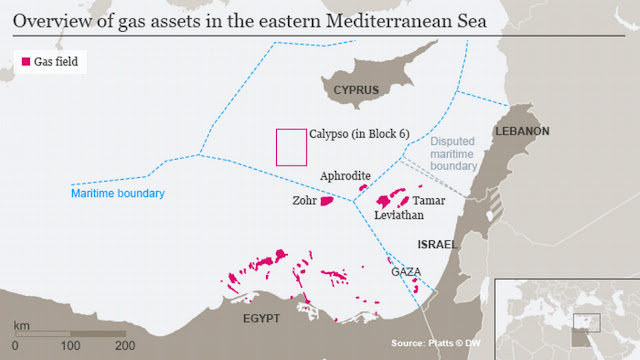During negotiations, mediated by the Biden administration, Israel conceded the entirety of its claims to the 330-square-mile zone to Lebanon in return for a 3-mile internationally recognized buffer zone adjacent to the shoreline. The remainder of the zone goes to Lebanon, which will also have the right to exploit a natural gas field known as Qana, which extends south of the frontier, and an obligation to remunerate Israel for the extracted gas there.The contours of the proposed deal are stunning. ...As per the new agreement, Lebanon will attain virtually 100% of its initial negotiating position.It’s a remarkable turn of events, especially given Beirut’s profound lack of leverage.
Hezbollah, the Iran-backed Lebanese terrorist organization, also played an important if indirect role in the talks. The organization has threatened to attack the Energean floating production system rig in Israel’s Karish field, south of the 23 line, if the ship started to extract gas prior to reaching an agreement on the maritime border. Before Hezbollah’s warning, Israel announced that pumping would start in September. In the absence of a deal, extraction didn’t commence.
Israel's logic seems to be that if Lebanon becomes a partner in selling natural gas, Hezbollah is far less likely to start another war. But Israel is permanently giving up hundreds of square miles of maritime rights for an assumption of logic on the part of a group that slavishly does whatever Iran tells it to do. And Hezbollah has a history of not giving a damn about Lebanon when it makes its own decisions.
It turns out that there was practically a mirror image of these negotiations happening on Israel's other maritime border, with Egypt. Al Monitor reports that Israel appears to have given up on its maritime rights in the sea off the Gaza coast as well:
Egypt succeeded in persuading Israel to start extracting natural gas off the coast of the Gaza Strip, after several months of secret bilateral talks, according to information provided to Al-Monitor by an official in the Egyptian intelligence service and a member of the PLO Executive Committee.
It comes after years of Israeli objections to extract natural gas off the coast of Gaza on security grounds...
The member of the PLO Executive Committee told Al-Monitor on condition of anonymity that Egypt informed the PA of Israel's approval to start extracting Palestinian gas off the coast of Gaza. He pointed out that this came after political pressure exerted by European countries on Israel to meet their needs for gas alternatives to Russian gas.
The PLO official said that under the agreement, Egypt and Israel would supervise the extraction process, and that part of the gas will be exported to Egypt, and the bulk of it will be exported by Israel to Europe through Greece and Cyprus. The financial revenues from the process of exporting Palestinian gas will return to the treasury of the PA, with part of these revenues allocated to support Gaza’s economy.
The details are fuzzy, but it is apparent that there are commonalities between the Lebanese and the Egyptian/PA agreements: Israel agreed to both under pressure from world powers, Israel abandoned its long standing positions protecting its own rights, and Israel hopes that these agreements will reduce the chances of war without her enemies Hezbollah and Hamas making or even hinting at a single promise.
Avoiding war is of course important, but assuming that making agreements with parties who are adjacent to irrational enemies will avoid war with those enemies is a hell of a stretch, especially one to give up permanent rights for.



